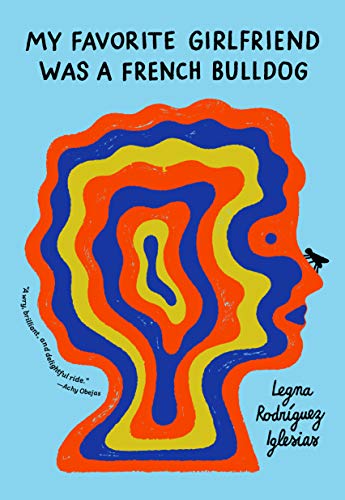Legna Rodríguez Iglesias’ eclectic novel-in-stories, My Favorite Girlfriend Was a French Bulldog (207 pages, McSweeney’s; translated by Megan McDowell), is a boundary-breaking work. Its various episodes slide comfortably along the scale of prose and poetry, and somewhere between fiction and nonfiction. (In an early disclaimer, Iglesias notes, “Any resemblance to actual events can be blamed on me. I don’t care.”)
Comprising fifteen stories, all composed by a single fictional(ized) protagonist, Iglesias’s self-assured voice transfigures into multiple others: that of an old dead man, a young girl, a wistful ex-con, and even a French bulldog. Certain voices are nostalgic, empathetic; others are acerbic and darkly funny. In free verse—a sort of broken prose—one narrator reflects on her family: “My dad, so smart, only said…that the most important thing in life was to know who you are. / How’s that for a laugh?”
Identity, and its mysterious nature, resides at the book’s heart. Note the cover, which evokes the layered mind of our protagonist. Her being is complex, multitudinous, and the vacillating form of her interior struggles against a fixed exterior.
That Iglesias boasts an illustrious career in poetry should come as no surprise. Nearly every line functions sufficiently as an image, idea, or concept. Repeated motifs, like fingerprints of another dimension, seamlessly link the stories: several times, our narrators compare people with trees, and tattoos with romantic partners who leave their marks behind. The titular bulldog mostly makes “subtle appearances” in “interesting phrases” placed between the stories. The animal calls to mind companionship, a desire for touch, presence, and affection—themes our characters struggle with. An early narrator, for example, resists all attachment, which she calls a sickness. Determined to leave a romantic partner, she says:
What’s there inside me I’m not going to tell you because it’s the only thing that’s mine. It’s the only thing people have, their insides. It’s ugly to say, mami, but I don’t care about your insides. What you have inside you that you always want to give me, that you offer like a gift, it slides right off me, mami. I don’t want anything from you, mamita, or from anyone … I only want you to leave and not bother me anymore with that tenderness and warmth, mami, that makes me wilt.
A later narrator, a poet, also conjures this dichotomy between the inner and outer, but arrives at the opposite conclusion: deep, inner connection infuses her with purpose. She is not interested in success, the so-called American Dream, if she cannot have tenderness and warmth. In a wry, “meta” moment, Iglesias undermines her very book as a way to inspire readers and to remind us of the singular importance of being known and loved:
I would rather be covered in ticks than write a book of poems about which the specialized critics say: precise and correct. Moreover, I would rather be covered in ticks than never see you again, laughing there in front of me. I don’t care if that smiling face of yours is a mask, or if that other face you have now is another mask, or if that other face you wear when you don’t agree with something is another mask. I don’t care about your masks, infinite and lovely. I don’t care about all those characters. Because deep down there’s a person, who is you, and I have come to find you.
A devastating conclusion emphasizes what Iglesias has been gesturing toward all along: that even for a writer, a solitary worker, life is nothing without companionship, being truly with others. In this regard, My Favorite Girlfriend Was a French Bulldog, at once wild, compassionate, and challenging, is also precise and correct.

